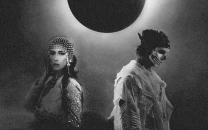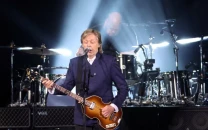Ali Zafar's 'Main Nahi Hoon' is a transcendent fusion of Pakistani, Turkish musical influences
Singer’s latest release delves into themes of surrender and divine connection
1701863476-0/Screenshot-(150)1701863476-0-640x480.webp)
Cross-cultural collaborations between Pakistan and Turkey remain in vogue and singer-songwriter Ali Zafar's Main Nahi Hoon underscores both this contemporary moment and the rich catalogue of Islamic Devotional Music. Released on December 3, Zafar’s latest record is an addition to this longstanding vision of transcendence dissociated from self, enlisting Turkish performers and elements of Turkish folk music.
Written by lyricist and poet Shoaib Ali, the song emphasises the annihilation of ego—the Sufi concept of Fana—invoking Zafar's realisation of the connection between the human and the divine, reminiscent of Dīwān al-Hallāj. The song opens with a fingerpicked acoustic guitar pattern, sustaining the contemporary aesthetic that Zafar has maintained throughout his career.
However, it is the lead melodies in Maqam Kurd on the flute that relay the first hint of the Turkish folk influence that will primarily dictate the compositional style of the track ahead. Following harmonization from a strong ensemble, the instrumental’s energy peaks right before the first verse and resolves as the violin bows halt; we hear the opening verses kick in "Jo Mujh Main Bolta Hai, Main Nahi Hoon", a statement of surrender to the divine.
The mystical verses are each separated by a small chunk of string ensemble melody that binds everything together, symbolising the oneness of existence. Zafar visits the South Asian Sufi thought and returns with Punjabi verses about Ishq, perhaps an attempt to unite a thinker like Waris with a preacher like Al-Hallaj.
While the song anticipates a probable ending, Zafar has yet another musical section to unleash, doubling the tempo. Albeit calculated, the fluctuation in tempo nonetheless pays an interesting homage to Sufi devotional music. In an emotional moment, the song resorts to the same words it began with: "Jo Mujh Main Bolta Hai, Main Nahi Hoon", etching a full circle to the point of initial realisation.
“We all somewhat struggle with the question of ‘Who am I?’" the singer muses in a short note accompanying the record. “Remove the ‘I’ and we open ourselves to the understanding that perhaps we are only vessels for something greater to flow through - manifesting itself in its glorious creativity,” Zafar offers.
He adds how this might take the shape of various art forms and articulations. “Sometimes as poetry, sometimes as music, sometimes only silence and sometimes nothing at all. And from that nothingness, emerges everything. I hope this song can make sense to some of that." Main Nahi Hoon is out on all streaming platforms.
Have something to add to the story? Share it in the comments below.



















COMMENTS
Comments are moderated and generally will be posted if they are on-topic and not abusive.
For more information, please see our Comments FAQ